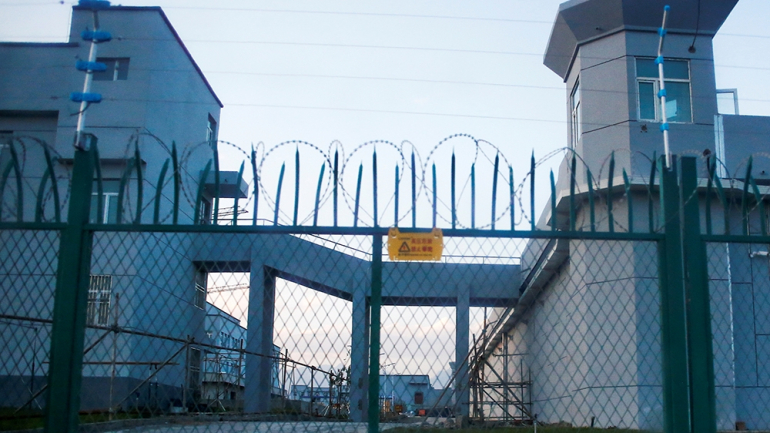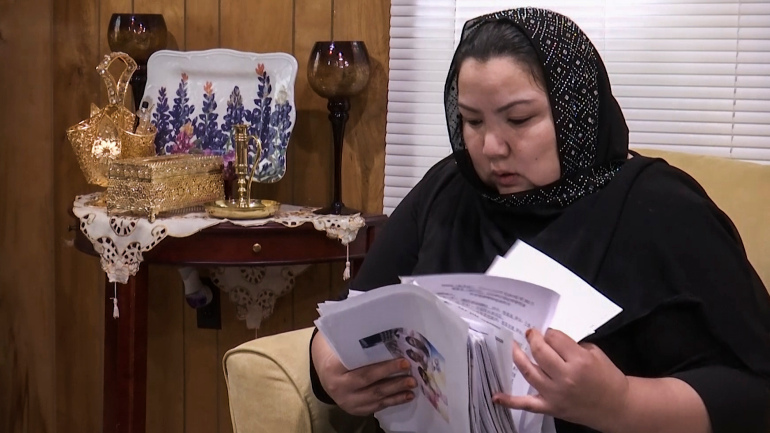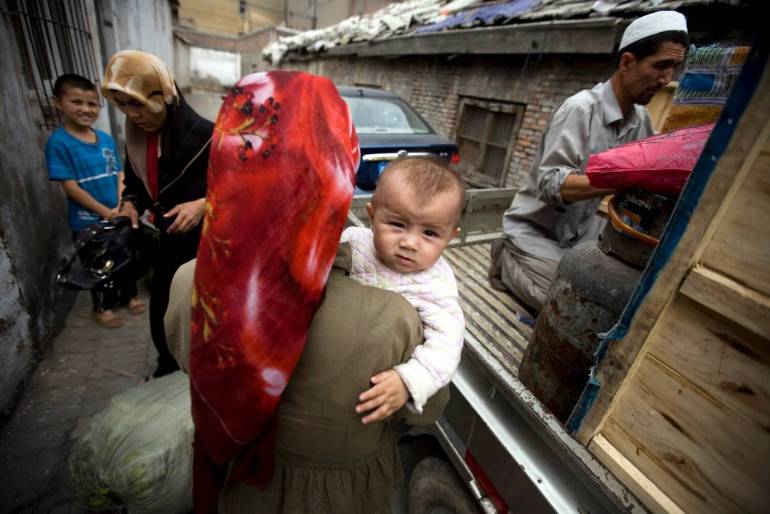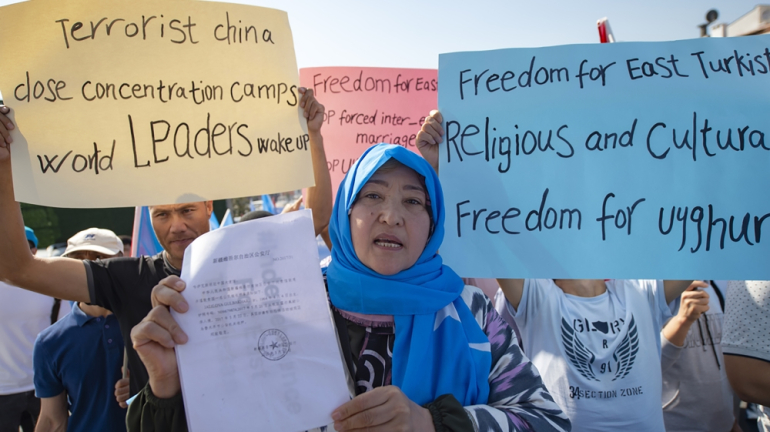It has been greater than two years since Sayragul Sautbay was launched from a re-education camp in China’s westernmost area of Xinjiang. But the mom of two nonetheless suffers from nightmares and flashbacks from the “humiliation and violence” she endured whereas she was detained.
Sautbay, a medical physician and educator who now lives in Sweden, just lately printed a ebook wherein she detailed her ordeal, together with witnessing beatings, alleged sexual abuse and compelled sterilisation.
In a latest interview with Al Jazeera, she shed extra mild on different indignities to which the Uighurs and different Muslim minorities had been subjected, together with the consumption of pork, a meat that’s strictly prohibited in Islam.
“Each Friday, we had been compelled to eat pork meat,” Sautbay stated. “They’ve deliberately chosen a day that’s holy for the Muslims. And should you reject it, you’ll get a harsh punishment.”
She added that the coverage was designed to inflict disgrace and guilt on the Muslim detainees and that it was “troublesome to clarify in phrases” the feelings she had each time she ate the meat.
“I used to be feeling like I used to be a unique individual. Throughout me bought darkish. It was actually troublesome to just accept,” she stated.
Testimonies from Sautbay and others present a sign of how China has sought to crack down in Xinjiang by taking intention on the cultural and non secular beliefs of the principally Muslim ethnic minority, implementing widespread surveillance and – from about 2017 – opening a community of camps it has justified as essential to counter “extremism”.
#Sayragul #Sautbay launched a ebook about her expertise at Chinese language focus camp (half 1). Chinese language Genocide coverage in opposition to the Native Folks of #EastTurkistan #Uygurs #Kazakhs #Kyrgyz #Uzbeks and #Tatars #IndepenceToEastTurkistan #FreeKazakhs pic.twitter.com/otlXJ9X6QQ
— FreeKazakhs (@FreeKazakhs) August 20, 2020
However paperwork made accessible to Al Jazeera present that agricultural improvement has additionally change into a part of what German anthropologist and Uighur scholar, Adrian Zenz, says is a coverage of “secularisation”.
Based on Zenz, the paperwork and state-approved information articles assist speak inside Uighur communities that there’s an “lively” effort to advertise and develop pig farming within the area.
In November 2019, Xinjiang’s prime administrator, Shohrat Zakir, that the autonomous area can be changed into a “pig-raising hub”; a transfer that Uighurs say is an affront to their lifestyle.
One information article printed in Might that Zenz recorded describes a brand new farm within the southern Kashgar space, which goals to provide 40,000 pigs every year.
The mission is predicted to occupy a 25,000-square-metre (82-square-foot) space in an industrial park in Kashgar’s Konaxahar county, renamed Shufu, in response to the Chinese language-language web site, Sina.
The deal was formally signed on April 23 this 12 months, the primary day of Ramadan, the Muslim fasting month and states that the pig farming will not be meant for export functions, however as an alternative “to make sure the availability of pork” in Kashgar.
The Uighurs make up 90 p.c of the inhabitants within the metropolis and the encircling space.
“That is a part of the try and utterly eradicate the tradition and faith of the folks in Xinjiang,” Zenz informed Al Jazeera.
“It’s a part of the technique of secularisation, of turning the Uighurs secular and indoctrinating them to comply with the communist social gathering and change into agnostic or atheist,” he added.
‘Three evils’
Beijing has defended its insurance policies within the area, saying the strategy is required to battle the “three evils of extremism, separatism and terrorism”, following lethal riots within the regional capital Urumqi in 2009.
It has denied the existence of the re-education camps wherein the United Nations has stated more than one million people have been held, as an alternative saying it operates vocational centres that permit it to “retrain” the Uighur inhabitants and educate them new abilities.
Like Sautbay, Uighur businesswoman Zumret Dawut has first-hand expertise of detention. She was picked up in March 2018 in Urumqi, the town the place she was born.
 Based on the Australian Strategic Coverage Institute in September, there are a minimum of 380 re-education camps and detention centres in Xinjiang [File: Thomas Peter/Reuters]
Based on the Australian Strategic Coverage Institute in September, there are a minimum of 380 re-education camps and detention centres in Xinjiang [File: Thomas Peter/Reuters]
For 2 months, Dawut stated authorities demanded explanations about her hyperlinks to Pakistan, her husband’s homeland. They questioned her as nicely about what number of youngsters she had, and whether or not or not they’d studied faith and skim the Quran.
She says she was humiliated repeatedly and on one event was slapped within the face with a rolled paper after displeasing her interrogator.
One other time, she needed to beg the camp’s male officers to permit her to go to the restroom, just for them to depart her handcuffed and watch her the entire time she was in the bathroom.
She too says she was served pork repeatedly.
“Whenever you sit in a focus camp, you don’t determine whether or not to eat, or to not eat. To be alive, we needed to eat the meat served to us,” she informed Al Jazeera by an interpreter.
 Zumret Dawut, who’s now dwelling in exile within the US, was detained for 2 months in her hometown of Urumqi and was repeatedly compelled to eat pork whereas in detention [File: Nathan Ellgren/AP)
Zumret Dawut, who’s now dwelling in exile within the US, was detained for 2 months in her hometown of Urumqi and was repeatedly compelled to eat pork whereas in detention [File: Nathan Ellgren/AP)
Yet those experiences could not have prepared her for what would happen next.
She and several other female detainees were sterilised to prevent them from having more children. The controversy was reported earlier this year by the Associated Press news agency, drawing widespread condemnation.
Starting them young
Sautbay, who was from the town of Ili, ended up in another camp after authorities learned that her husband and their two children had left for neighbouring Kazakhstan in early 2016.
She had originally planned to join them but by then authorities had confiscated her passport and that of other civil servants.
Because of her medical background and experience in running preschools, Sautbay was assigned to teach her fellow detainees the Chinese language, allowing her to closely observe what was happening to the Uighurs.
She says the practice of making Muslims eat pork went beyond the detention camps.
In one school in Altay, a city in northern Xinjiang, students were also forced to eat the meat and when many refused and demonstrated against their school administrators, the government sent in soldiers to intervene, Sautbay said.
The Xinjiang government also started an initiative called “free food” for Muslim children in kindergarten, serving them pork dishes without their knowledge, she added.
The idea was that by starting them young, the Muslim children would acquire a taste for non-halal food.
 The Xinjiang government has also reportedly started feeding Uighur children pork, with the idea that by starting them young, they would develop the taste for non-halal food [File: Diego Azubel/EPA]
The Xinjiang government has also reportedly started feeding Uighur children pork, with the idea that by starting them young, they would develop the taste for non-halal food [File: Diego Azubel/EPA]
“China is utilizing and can use totally different techniques to pressure Uighurs and different Muslim inhabitants to eat pork,” Sautbay stated.
Final 12 months, the Italy-based AsiaNews alleged that in the course of the Chinese language Lunar New Yr, which occurred to be the “Yr of the Pig”, authorities officers reportedly delivered pork on to Muslim households in Ili, and insisted that Uighurs adorn their properties for the festive season.
‘Normalising’ the forbidden
Arslan Hidayat, a Turkey-based Uighur rights activist and secretary-general of the Uyghur Revival Affiliation, informed Al Jazeera that whether or not it’s breeding pigs, or consuming pork and ingesting alcohol, the Chinese language authorities is making an attempt to “normalise” prohibited practices for Muslims in Xinjiang.
In 2018, as a part of official state coverage, the Xinjiang authorities additionally introduced that every one halal eating places within the area can be required to “operate normally” throughout Ramadan, in distinction to earlier years when those self same institutions had been closed in the course of the month-long ritual of fasting.
Based on the Xinjiang authorities web site, which printed the memorandum containing the availability on Muslim meals institutions, the directive was meant to make sure “regular life order throughout Ramadan.”
However Zenz believes the directive meant the federal government wished to ensure “Uighurs eat and don’t quick” in the course of the day.
He additionally shared two different official paperwork, written within the Chinese language language, which confirmed the federal government in Kashgar allotting cash for meals for his or her principally Muslim Uighur employees throughout Ramadan.
Taken collectively, this constitutes a sample of the Chinese language authorities finishing up a “conflict in opposition to halal”, Zenz famous referring to the time period utilized in Islam to explain acceptable meals and different every day practices.
In 2018, the Reuters information company additionally reported on an “anti-halal campaign” in Urumqi “to cease Islam penetrating secular life and fuelling ‘extremism’”.
‘Radicalised’
Chatting with Al Jazeera about China’s total coverage in direction of Uighurs, Einar Tangen, a China affairs professional based mostly in Beijing, stated that the Chinese language authorities “feels strongly” that lots of Xinjiang’s residents have been “radicalised” in recent times.
 Exiled Uighur teams dwelling in Turkey maintain a protest in Istanbul to name consideration to alleged rights abuses by the Chinese language authorities in Xinjiang [File: Yasin Akgul/AFP]
Exiled Uighur teams dwelling in Turkey maintain a protest in Istanbul to name consideration to alleged rights abuses by the Chinese language authorities in Xinjiang [File: Yasin Akgul/AFP]
In Beijing’s view, the one method to deal with the scenario in Xinjiang is to offer residents “the schooling that they need to have gotten after they had been youthful.” Thus the “coaching camps”.
“That is what they [government] say, and they’re shifting folks by this schooling camps. They educate them abilities, language, historical past, and that’s their means of coping with it.”
However the activist Hidayat notes that even non-observant Uighurs, lots of them authorities workers who had tried to undertake a way of life just like the Han Chinese language, had not escaped punishment. They too had been despatched to the camps, by advantage of their racial identification alone, he stated.
Tangen, nevertheless, identified that the financial scenario in Xinjiang had “improved dramatically through the years” and folks there have been higher off.
“Folks dwell longer. They’ve higher alternatives,” Tangen famous.
“So there’s at all times this rigidity between what the West says is your human rights, to talk freely, do what you need, and the concept with out financial alternative and meals on the desk, rights don’t imply loads.”
Close to the precise allegations of forcing Muslims to eat pork, Tangen stated that he didn’t know whether or not the data was “factual”, but when it was happening it was not the results of “central authorities coverage.”
The paperwork seen by Al Jazeera are amongst a cache that additionally detailed the alleged sterilisation programme reported by AP.
“I’m certain that there are issues which are occurring that shouldn’t be occurring. However until I’ve among the information, it’s not possible” to find out the veracity of the allegations, Tangen stated.
In an enormous paperwork like that of China, there could also be “some folks” who would possibly commit abuses, he stated.
“The bottom line is to search out these folks and punish them.”
The Chinese language authorities has had little to say concerning the subject, though varied state-controlled publications questioned the credibility of each Sautbay and Dawut after they made allegations of different abuses in Xinjiang.
Beijing has additionally accused Zenz, the German anthropologist, of “fabricating information and falsifying knowledge” and pointed to his hyperlinks to “right-wing” factions of the US authorities. China observers additionally raised questions on his “sudden experience” on Xinjiang and the Uighurs.
Al Jazeera has sought an official response from China’s international ministry however has but to obtain a reply. It has additionally requested remark from the Institute for Human Rights at China College of Political Science and Legislation, nevertheless it had but to reply on the time of publication.
Dawut, the Uighur businesswoman now dwelling in exile within the US, says she stands by her story of what occurred to her contained in the camps.
In the meantime, Sautbay, the Kazakh medical physician, stated that by sharing her ordeal, she hoped to be a voice for many who stay in captivity.
“The times I’ve spent within the focus camp is not going to be erased from my reminiscence, and I’ve to dwell with it my complete life,” she stated.






